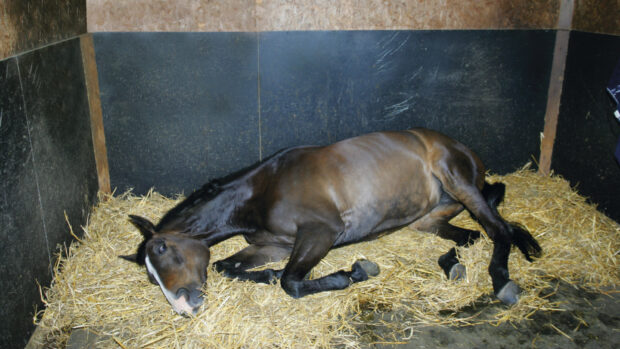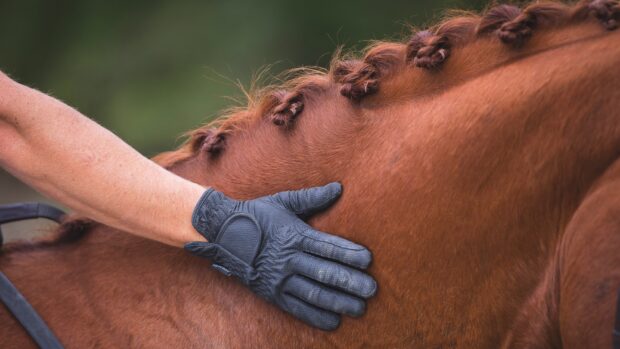Owners’ attitudes to emergency colic recommendations are under review – as vets come out on top as the lead source of information.
In a study published last month in the Equine Veterinary Journal, researchers from the University of Nottingham investigated owner beliefs and practices associated with emergency colic planning. The research, funded by the university and World Horse Welfare, involved 701 participants in an online survey split into four sections; participant demographics, planning for a colic emergency, experience of colic, and awareness of the British Horse Society (BHS) REACT Now to Beat Colic campaign.
Findings included the fact 77.5% of participants had direct personal experience of managing colic, but very few had experience of referral or euthanasia as a direct result of colic, suggesting that their current state of preparedness “may actually relate to their response to mild, rather than critical episodes of colic”. Veterinary professionals were the main source of 63.1% of participants’ colic knowledge, and 67.6% of respondents agreed that having an emergency colic plan would improve their horses’ welfare. When the survey was conducted in 2018, only 20% of participants were aware of the REACT campaign. One of REACT’s recommendations is to take horses’ temperature weekly, but 72.4% of respondents did not do this, and had no intention to start.
The researchers analysed the data using human behavioural change models and discussed that despite the fact many participants had experience of colic and were concerned about future occurrences, neither of these factors was found to be “significantly associated” with intention to adopt emergency recommendations. They concluded that most owners perceived vets as influential on their decision to plan for a colic emergency, but the role of other people’s opinions and experiences was also identified as a “potential barrier” to information dissemination and informed decision-making.
Lead author Katie Lightfoot told H&H the aim of the work was to gain an understanding of how ready owners were to take on new information – and what could be done to improve the uptake of educational campaigns.
“We can’t put pressure on people to change what practices they feel have worked for them, and some owners are already carrying out the recommendations when it comes to emergency colic planning,” said Dr Lightfoot.
“The results highlight that we need to work with owners, rather than saying ‘You’re doing something wrong’. But the biggest positive is how engaged owners are. Using behaviour change methodology is a newly emerging approach in veterinary research, and listening to, and collaborating with owners, is the best way to improve equine welfare.”
British Equine Veterinary Association president David Rendle told H&H the study picked up on a number of “topical issues”.
“The way we keep animals comes under increasing scrutiny and we now accept that with that privilege comes a responsibility to optimise the welfare of our horses,” he said.
“Human behaviour determines our horses’ quality of life and human resistance to change often stifles improvements in equine health. Most of a vet’s daily work is spent addressing issues directly or indirectly related to management; lameness, obesity, laminitis, infectious disease and colic. We know that beliefs around care and management are deeply entrenched and can be hard to change, however this study highlights that through understanding the barriers to change and and implementing initiatives such as the REACT campaign we can bring about change in owner behaviour and improvements in equine welfare.
He added that it is “reassuring” owners cited vets as the most influential source in planning for a colic emergency.
“It would be great if we could be equally influential on a whole range of issues that affect equine health and welfare,” he said.
BHS welfare campaigns officer Gabby Madders told H&H that since the survey, the society has invested in the growth of REACT, including the launch of Colic Awareness Week, the development of the downloadable equine care and emergency plan, and working with 72 “Vet REACT colic champions” to support their clients.
“Our resources give owners all the tools they need to take the time to confidently consider what they would want to happen in all circumstances, including critical emergencies,” she said.
“Driving this awareness will be critical if we want all horse owners to be able to efficiently prepare for any colic case.”
You might also be interested in:

Colic in horses: what every horse owner needs to know

Impaction colic in horses: signs, treatment and prevention

Subscribe to Horse & Hound magazine today – and enjoy unlimited website access all year round
Horse & Hound magazine, out every Thursday, is packed with all the latest news and reports, as well as interviews, specials, nostalgia, vet and training advice. Find how you can enjoy the magazine delivered to your door every week, plus options to upgrade your subscription to access our online service that brings you breaking news and reports as well as other benefits.



